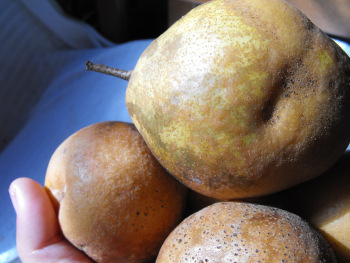
Food and Health, Part 4
 Diet
for a Poisoned Planet
has a different approach, identifying high-energy low-toxin foods which
not only fight cancer but also help prevent a host of other diseases,
from heart disease to Parkinsons to attention deficit
disorder.
Diet
for a Poisoned Planet
has a different approach, identifying high-energy low-toxin foods which
not only fight cancer but also help prevent a host of other diseases,
from heart disease to Parkinsons to attention deficit
disorder.
Eating plenty of plant
food is a key to eating healthy. Plants are low on the food
chain, and, the higher up that chain you eat, the more concentrated are
pollutants. "Cows, pigs, and other animals raised for slaughter
have concentrations in their flesh of chemical residues and biological
toxins from all the food they eat--thousands of plants laced with
chemical pesticides or fungal contaminants and microorganisms in their
feed. And the pesticides that accumulate in animal flesh are the
same ones that can accumulate in human flesh. The higher up the
food web you eat, the greater concentration of toxins you are likely to
consume. Humans, not surprisingly, are among the most poisoned
creatures on earth."
Steinman's book is full of
practical advice. For example, it has tables showing what
combinations of plant foods make complete proteins. To fight air
pollution, the author lists which plants and fruits are highest in
beta-carotenoids. He runs through through the essential vitamins
and minerals and lists which plants supply them and tells when
supplements are needed.
Navy
beans
Navy Beans had two pesticide residues, BHC and diazinon. Onions Onions had few residues, only two in thirty-six market baskets. --Diet for a Poisoned Planet, David Steinman, Thunder's Mouth Press, 2007 |
This post is part of our Food and Health lunchtime series.
Read all of the entries:
|
Want more in-depth information? Browse through our books.
Or explore more posts by date or by subject.
About us: Anna Hess and Mark Hamilton spent over a decade living self-sufficiently in the mountains of Virginia before moving north to start over from scratch in the foothills of Ohio. They've experimented with permaculture, no-till gardening, trailersteading, home-based microbusinesses and much more, writing about their adventures in both blogs and books.
Want to be notified when new comments are posted on this page? Click on the RSS button after you add a comment to subscribe to the comment feed, or simply check the box beside "email replies to me" while writing your comment.
